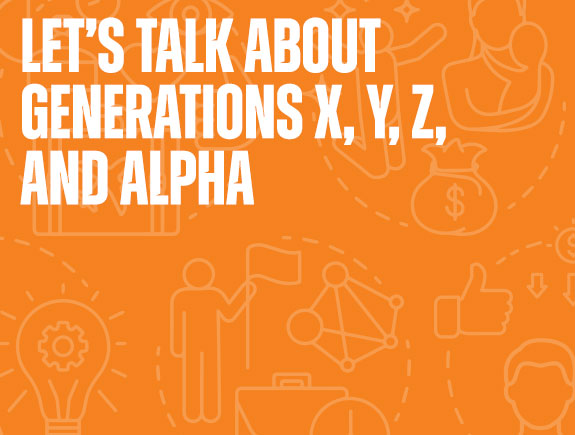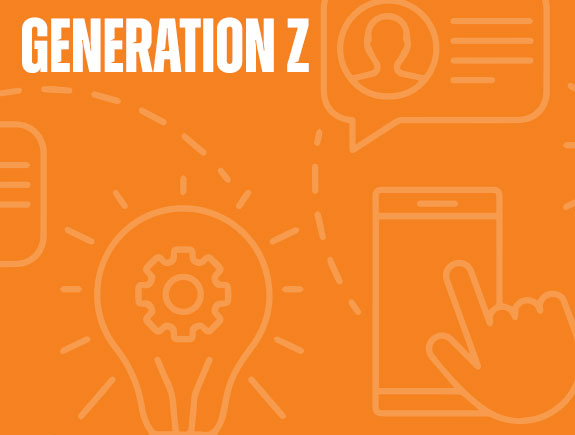Marketing agency people deal with the above-mentioned terms on a daily basis, usually when it comes to defining the target audience. These terms should ease the understanding of the population our campaign is addressed to, but also impact the strategy, creative messages, even the media choice used to reach the right audience. Demographic groups actually represent groups of people with similar characteristics, born in a specific time period, but the list of their similarities doesn’t end with their age. Due to growing up in more or less similar circumstances, and historical contexts, members of one group also share certain values, habits, concerns, and comprehension that define them all.
By classifying people in this way, we not only understand their age but also the life stage they live in. We can also understand their concerns, wishes; financial solvency; priorities; how much they consume social media, how much they trust traditional media; their attitude towards ecology; politics, ideology…Of course, this type of categorization is not applicable to each individual case but certainly is on a statistically significant level.
Baby boomers are people born in the first two decades after World War II, and currently, they are in the 58-76 range. They are followed by gen X, this gen covers the period since 1965. – 1980. Millenials cover the next generation, and the age between 26-and 40. Gen Z, the top target of everyone in the advertising world, covers the period between 1995. – 2012. The next generation is the so-called Alpha gen.
What conclusions did demographers and sociologists come to? What do we know about each of these groups?
Baby boomers.
Though young gens make fun of baby boomers and their behavior on the internet, the fact this generation easily adopted that technology too, reveals the important truth about people from this period. Namely, they belong to the generation that experienced the most technological changes in their life, and they’ve managed to adopt them all. It seems their favorite innovation in television as they mostly consume that innovation. They also consume traditional media like printed media and radio.
During their lifetime they were exposed to the banking revolution but they still follow their initial habits. Based on the research, baby boomers almost exclusively use cash as their main paying means, and they prefer ’physical’ to electronic banking. From a financial aspect, this generation went through its peak, their financial solvency is less in comparison to the young population, and their main occupation is supporting their kids.
The events that shaped the boomers are the Cold War and the optimism that existed after the victory over fascism.
Generation X.
This generation is often neglected because it is between boomers and millennials, two significantly larger demographic groups. It seems it has been the case since their early childhood. Namely, due to the fact they were born in families where usually both parents were working, this generation is prone to expressing individuality and independence throughout their whole life.
Just like baby boomers, Gen X likes TV the most, which justifies their nickname – MTV generation. This generation has a strong technical knowledge and pops up as the first generation that grew up with computers. Gen X is skilled in using the internet, they do thorough research before shopping, and how a certain loyalty to the chosen brand.
Also, this gen is inevitably shaped according to unfortunate events in the 90s.
Millennials.
Due to the fact this gen spends the most money, it is expected they will become the richest generation by 2030. They grew up with computers, but also made a smooth transition to smartphones. Most of them use electronic banking and shop online.
They don’t grow loyalty to brands, and their shopping is based on practicality and function as they don’t have patience for bad and inefficient products. This is the reason they pick brands with superior reputations.
The global economic crisis has affected them, so millennials later decide on huge life steps like weddings or buying a house or apartment. It is more important for them to have access to certain things than to be their owners, so no wonder it’s a common cause that most of them are tenants.
They value individuality, and in comparison to the next generation, don’t have a huge need to belong to anything.
Generation Z.
This generation is often associated with TikTok, but in fact, it is much more than that. Earlier than others they became financially aware, and after seeing their parents in trouble, they do not want to get into the same situation.
Their whole life is on the phone, research shows that most of them got their first mobile phone at the age of ten, but they played with their parents’ phones even earlier. They have accounts on mass social networks and are constantly researching alternatives. They like raw and honest content and are interested in socially important and environmental topics. They prefer belonging to a certain group, and at an early age show independence, both economic and emotional.
They are loyal to brands but have high expectations. Not only do they want quality products, but they want brands to share their views on important life and social issues with them.
Generation Alpha.
What Marketers Need to Know About Gen Alpha
Today, the world belongs to Generation Z, but tomorrow (which is quickly approaching) will belong to Generation Alpha. That’s why we decided to write more about this generation, as they are the least understood so far, with most of the focus still on Zoomers.
Gen Alpha is already showing signs of being a unique, global, and progressive group, so marketing professionals will need to find ways to connect with the most sophisticated audience yet.
But how can we predict the identity of individuals in this group, whose oldest members are currently young teenagers? What makes Gen Alpha different from Gen Z, and what will they look like in five, ten, or fifteen years when they become the dominant demographic group?
Key Word – Altruism
Generation Alpha is the most socially aware and progressive generation so far. They are extremely conscious of environmental and social issues such as climate change, resource scarcity, and population growth.
Despite their youth, they are highly interested in topics like the rise of the middle class, ending racism, and opportunities and equality for all demographic groups. They see it as their responsibility to address these important goals on a global level, not just locally. Part of this may be youthful optimism that could fade over time, but for now, they see themselves as guardians of the future.
What Does This Mean for Marketers?
You will need to highlight your brand’s ethical and altruistic values if you want to connect with Generation Alpha. It won’t be enough to just talk about or run hashtag campaigns. Generation Alpha is an extremely sophisticated group that, thanks to their technological literacy, has been exposed to marketing at an earlier age and more frequently than any generation before them.
While they are an optimistic generation that can be very trusting of people, this early exposure to marketing and high level of sophistication also makes them somewhat skeptical. Simply put, they are quite good at detecting inauthentic messages.
The solution is to show what you say through actions. If your brand truly cares about a cause and supports it, great, you can focus on that. But pretending won’t get you anywhere with Generation Alpha. If you want to win them over, you must prove that you are on their side.
A hashtag won’t get you anywhere—but a significant donation might. Or a portion of sales designated for a reputable charity demonstrates that your brand is serious about these issues, not just seeking points.
Every Generation Has Its Uniqueness, but Gen Alpha Is the Most Unique
In conclusion, it will take a lot of creativity, sharpness, and authenticity to sell a product to Generation Alpha in the coming years and decades.
Fortunately, various AI tools, like ChatGPT, which we also frequently write about on our blog, will assist us in this endeavor. With the creativity and authenticity of marketers on one side and the speed of artificial intelligence on the other, the campaigns we create will be tailored to the needs of the most unique and sophisticated generation so far.
If you also like reading about marketing trends that appeal to Generation Z, then our blog is the right place for you, as we often focus on different generations, given that we study them as part of potential target groups we address in our clients’ campaigns.

















